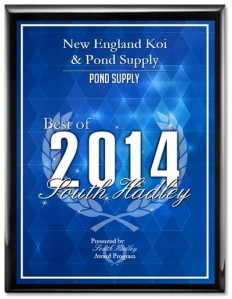The pH is in all respects a measure of acidity and alkalinity, pH 0 - 6.99 is acid- pH 7.0 is regarded as neutral and pH 7.01 - 14.0 is alkaline. On the whole the pH is not generally a problem but it can have a profound effect on the toxicity of ammonia. Alkaline water, that is with a pH of over 7.01 in combination with increasing temperatures causes more of the ammonia to exist in the free form, which is very poisonous to fish.
The higher the pH and water temperature the greater percentage of the ammonia which exists in this harmful free form. If the water is alkaline it is worth bearing in mind that this will affect the toxicity of ammonia and that even very low readings could therefore be quite serious for the welfare of the pond fish.
The pH of the pond is largely dependent on the pH of the make-up water in the surrounding area and therefore it is not possible to try to control this parameter artificially.
More Pond Water Chemistry
Alkalinity, often referred to as -carbonate hardness, or German carbonate hardness, is the measure of carbonate and bicarbonate concentrations in your aquarium water. Alkalinity is a measure of the...(click on product image for more details)
Where does the ammonia originate from
Pond fish produce waste in the form of ammonia, which is released into the water through the gills. Ammonia can also originate from the dead and decaying plant...(click on product image for more details)
Acceptable concentration 0
A gas widely used in the disinfection of water and as an oxidizing agent for organic matter, manganese, iron, and hydrogen sulfide.
Chlorine is known to react with...(click on product image for more details)
Sometimes referred to as an algae bloom, Another factor which can influence the pH of the water is the presence of plants, most notably if there is an algae bloom in the pond. During the hours of...(click on product image for more details)
Nitrate, NO3-N,
Nitrate is the final product from the breakdown of ammonia released by the fish.
Nitrate is not especially harmful to freshwater fish but is a potent plant fertilizer and can...(click on product image for more details)
As the ammonia in the water begins to reduce, the secondary break down product, nitrite will begin to increase and this is also very poisonous to fish.
Nitrite is a skin irritant and will cause the...(click on product image for more details)
Common salt, Sodium Chloride -NaCl- is commonly used in the health care and maintenance of fishes especially Koi. Salt is useful in treating parasites. It will eliminate seven out of nine parasites that...(click on product image for more details)
Partial water change outs can reduce the amount of anything dissolved in the water but not totally remove it. Although it is sometimes necessary, draining and refilling a pond should only be used as a...(click on product image for more details)

